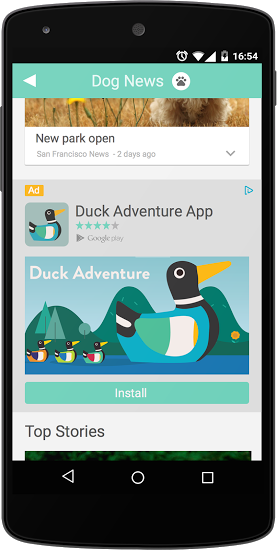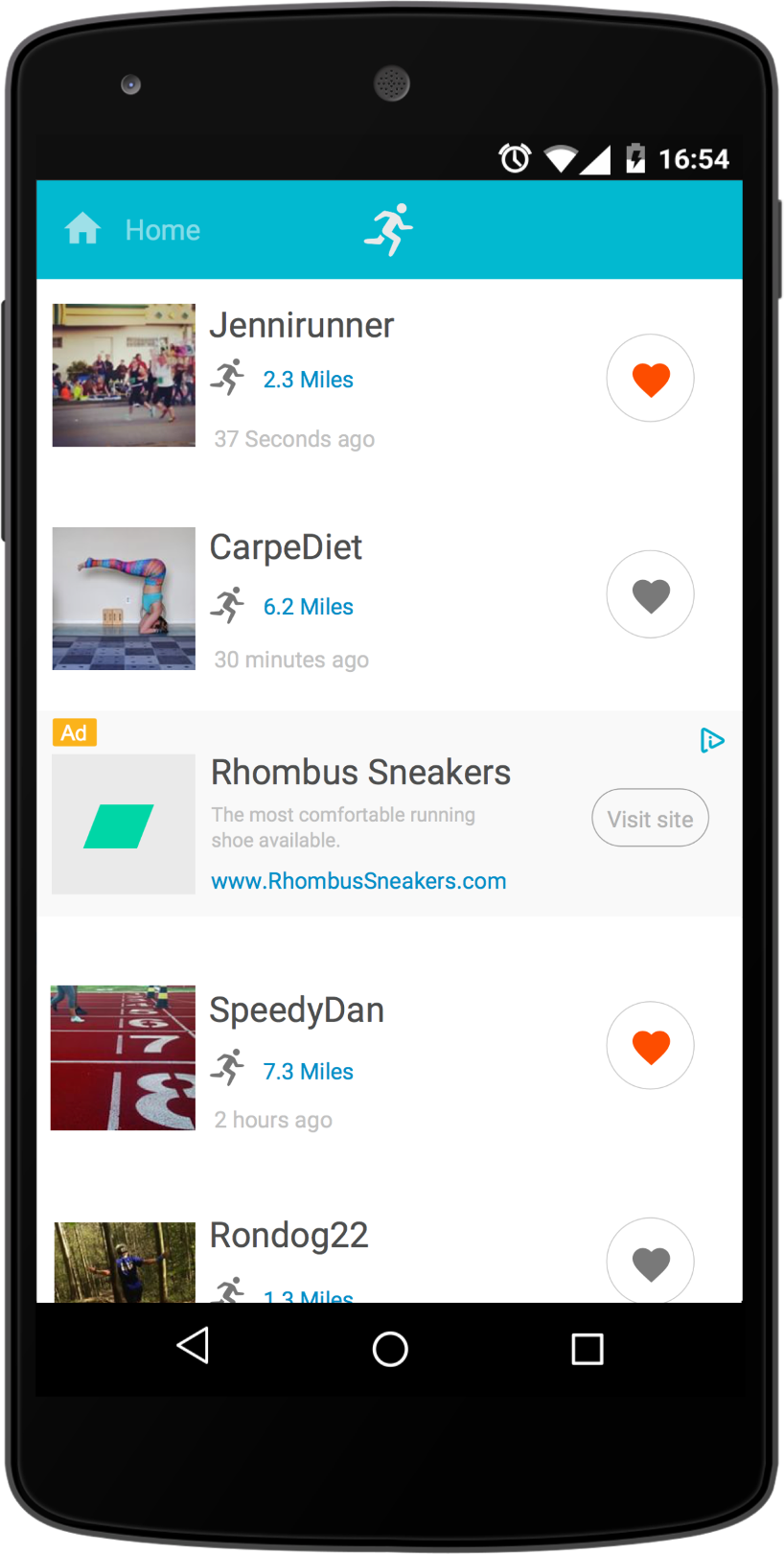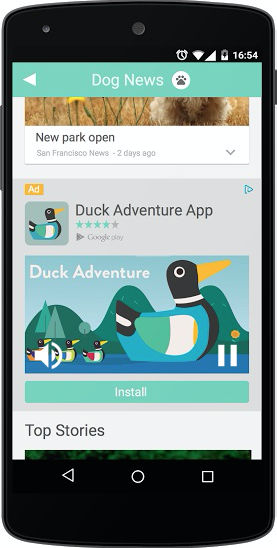Page Summary
-
Native ads are designed to match the surrounding content and visual style for better user engagement.
-
Native ads are available on mobile apps, desktop websites, and mobile websites.
-
The workflow for native ads involves a call to Google, a bid request to buyers, buyer responses, auction, and final ad assembly by the publisher.
-
Native ads are supported for both Authorized Buyers and Open Bidding and adhere to the OpenRTB specification.
-
Different native ad templates exist, such as App Install and Content, each with specific required and recommended fields for images, text, and other elements.
Native ads are ads formatted to fit the surrounding content and visual design, making them more likely to be viewed and clicked by users. Native ad inventory is available on mobile apps as well as desktop and mobile websites. For more information on native ads, see Overview of native ads.
Native ads are supported for both Authorized Buyers and Open Bidding.
Here's the workflow for native ads:
- A call for a native ad is made to Google. The call specifies one or both of the following native ad templates, each specifying the preferred native fields.
- Google sends buyers an RTB bid request containing a list of the fields being requested.
- Interested buyers respond with the requested fields.
- Google runs an auction to select the winning bid and sends the buyer's supplied creative assets to the publisher.
- The publisher assembles the assets into a native ad and styles them to fit the site's design.
Message formats
Google supports the OpenRTB specification in both JSON and Protobuf.
For OpenRTB Protobuf native ads, the following fields differ from the specification:
| JSON | JSON type | Protobuf | Protobuf type |
|---|---|---|---|
BidRequest.imp[].native.request |
string |
BidRequest.imp[].native.request_native |
NativeRequest |
BidResponse.seatbid[].bid[].adm |
string |
BidResponse.seatbid[].bid[].adm_native |
NativeResponse |
The OpenRTB Protobuf fields are Protobuf messages rather than strings.
If you use the OpenRTB Protobuf implementation, your endpoint receives bid
requests containing BidRequest.imp.native.request_native
rather than BidRequest.imp.native.request. Additionally,
your endpoint must return bid responses that populate
BidResponse.seatbid.bid.adm_native rather than
BidResponse.seatbid.bid.adm, otherwise it will be filtered
from the auction.
When placing a bid including a native ad, your bidding endpoint must
specify the required assets and any optional assets you choose to include
in the BidResponse.seatbid.bid.{adm/adm_native}.assets field.
Assets sent in the response must include the corresponding id
value specified in the bid request. The id is used to
structure the template and distinguish similar kinds of assets such as main
images and icons. The following example shows how
NativeRequest and NativeResponse objects are
populated in OpenRTB and JSON formats:
OpenRTB JSON (parsed)
{ "ver": "1.2", "assets": [ { "id": 1, "required": 1, "title": { "len": 25 } }, { "id": 2, "required": 1, "data": { "type": 2, "len": 90 } }, { "id": 3, "data": { "type": 12, "len": 15 } }, { "id": 4, "required": 1, "img": { "type": 3, "wmin": 1200, "hmin": 627 } }, { "id": 5, "required": 1, "img": { "type": 1, "wmin": 100, "hmin": 100 } }, { "id": 6, "data": { "type": 3, "len": 5 } }, { "id": 7, "data": { "type": 6 } } ], "eventtrackers": [ { "event": 1, "methods": [ 1 ] } ] }
NativeResponse
{
"ver": "1.2",
"assets": [
{
"id": 1,
"title": {
"text": "Luxury Mars Cruises"
}
},
{
"id": 2,
"data": {
"value": "Visit the planet in a luxury spaceship."
}
},
{
"id": 3,
"data": {
"value": "Book today"
}
},
{
"id": 4,
"img": {
"url": "https://native.test.com/image?id=123456",
"w": 100,
"h": 100
}
},
{
"id": 5,
"img": {
"url": "https://native.test.com/icon?id=123456",
"w": 200,
"h": 200
}
}
],
"link": {
"url": "https://www.google.com",
"clicktrackers": [
"https://native.test.com/click?id=123456"
]
},
"imptrackers": [
"https://test.com/impression?id=123456&amt=${AUCTION_PRICE}"
]
}OpenRTB Protobuf
request_native { ver: "1.2" assets { id: 1 required: true title { len: 25 } } assets { id: 2 required: true data { type: DESC len: 90 } } assets { id: 3 data { type: CTATEXT len: 15 } } assets { id: 4 required: true img { type: MAIN wmin: 1200 hmin: 627 } } assets { id: 5 required: true img { type: ICON wmin: 100 hmin: 100 } } assets { id: 6 data { type: RATING len: 5 } } assets { id: 7 data { type: PRICE } } eventtrackers { event: IMPRESSION methods: IMG } }
NativeResponse
adm_native { assets { id: 1 required: true title { text: "Luxury Mars Cruises" } } assets { id: 2 required: true data { value: "Visit the planet in a luxury spaceship." } } assets { id: 3 data { value: "Book today" } } assets { id: 4 required: true img { url: "https://native.test.com/image?id=123456" w: 1200 h: 627 } } assets { id: 5 required: true img { url: "https://native.test.com/icon?id=123456" w: 128 h: 128 } } assets { id: 6 data { value: "5" } } link { url: "https://www.google.com" clicktrackers: "https://native.test.com/click?id=123456" } imptrackers: "https://test.com/impression?id=123456&amt=${AUCTION_PRICE}" }
If you use a buyer SDK to render native ads,
you must include an image type in the declared_ad when you
submit creatives for review.
Native ad templates
Native ad templates describe the components of a native ad, and determine
the contents and structure of the NativeRequest in the bid
request. Google supports the two most common native ad templates for non-video
and video native ads:
- App install ad template - Promote and drive mobile app installs.
- Content ad template - More generic combination of text and images for brand or web ads.
- Video app install ad template
- Video content ad template
Other templates exist, and may have a different set of requirements for fields, dimensions, and sizes.
App install ad template

Required and recommended fields
The following tables show fields labeled Required or Recommended. The following rules apply:
- Fields marked Required are required by the bidder.
- Fields marked Recommended are not required by the bidder, and the publisher may or may not display them if supplied (for example, star rating).
- Call to Action (CTA) is always marked as Recommended because a default is assigned if one is not sent by the bidder, but it will always be displayed if sent.
The following table lists the fields of an app install ad template. Mobile apps use these fields to create native app install ads.
| Field | Description | Required or Recommended? | Always displayed? | Recommended image size/max number of chars | Example |
|---|---|---|---|---|---|
| Headline | The app title | Required | Yes | 25 chars | Flood-It! |
| Image | A screenshot from the app, or another relevant image | Required | No | 1,200px x 627px or 600px x 600px depending on the aspect ratio required by the publisher. | <A screenshot from the game Flood-It!> |
| Body | Main text of the app | Required | No | 90 chars | Deceptively simple + tantalizingly challenging = delightfully addictive! |
| App icon | The app icon | Required | No | 128 x 128 px | <Flood-it! app icon> |
| Call to action | Preferred user action | Recommended | Yes | 15 chars | Install |
| Star rating | Number of stars (0 - 5) representing the app's rating in the app store | Recommended | No | 0 - 5 | 4.5 |
| Price | The cost of the app | Recommended | No | 15 chars | Free |
Notes about text length
If a buyer sends a text asset (body text, for example) longer than the suggested maximum number of characters, the text may be truncated and ellipsized by Google or the publisher. Note that the truncation limits are half the size in Chinese, Japanese, and Korean. For example, the headline limit is 90 for English and 45 for Chinese.
Notes about image size
Publishers are allowed to:
- Crop the main image symmetrically by up to 20% in one dimension (height or width).
- Scale the image without changing its aspect ratio.
- Images that have aspect ratios substantially different than those implied by the height and width may be filtered.
Content ad template

The following table lists the fields of a content ad template. Publishers use these fields to create native content ads.
| Field | Description | Required or Recommended? | Always displayed? | Recommended image size/max number of chars * | Example |
|---|---|---|---|---|---|
| Headline | The ad header | Required | Yes | 25 chars | Lowest mortgage rates |
| Image | The ad's primary image | Required | No | 1,200px x 627px or 600px x 600px depending on the aspect ratio required by the publisher. | <Ad's main image> |
| Body | The ad content | Required | No | 90 chars | Your home sweet Brooklyn home - cheaper and sooner than you think! |
| Logo | Advertiser's logo or another relevant small image | Recommended | No | 128 x 128 px | <NY Mortgage Inc.'s logo> |
| Call to action | User's preferred action | Recommended | No | 15 chars | Get a quote |
| Advertiser | Text that identifies the advertiser or brand | Required | No | 25 chars | NY Mortgage Inc. |
Video app install ad template
| Field | Description | Required or Recommended? | Always displayed? | Recommended image size/max number of chars * | Example |
|---|---|---|---|---|---|
| Video | The video VAST response containing all necessary assets to play back a video ad. | Required | No | - | A URL to VAST XML containing a Flood-It! Video ad |
| Headline | The app title | Required | Yes | 25 chars | Flood-It! |
| Image | Image (thumbnail) shown in the player before the video ad is clicked or while it is loading. | Required | No | Should match aspect ratio of video (for example: 1280x720 for 16x9 video, 4x3 for 640x480 video). | A screenshot from the game Flood-It! Or from the video |
| Body | Main text of the app | Required | No | 90 chars | Deceptively simple + tantalizingly challenging = delightfully addictive! |
| App icon | The app icon | Required | No | 128 x 128 px | Flood-it! app icon |
| Call to action | Preferred user action | Required | Yes | 15 chars | Install |
| Star rating | Number of stars (0 - 5) representing the app's rating in the app store | Recommended | No | 0 - 5 | 4.5 |
| Price | The cost of the app | Recommended | No | 15 chars | Free |
Restrictions
Video: All video must be in the form of a VAST URL or a VAST Tag. A raw video file such as a WebM, MP4, etc cannot be specified.
Text length: If a buyer specifies a text asset such as the
bodyin the response, it may be truncated and ellipsized by Google or the publisher. Note that truncation limits are half the size in Chinese, Japanese, and Korean. For example, the headline limit is 90 in English and 45 for Chinese.Image size: Publishers are allowed to:
- Crop the main image symmetrically by up to 20% in one dimension (height or width.
- Scale the image without changing its aspect ratio.
App install ad example

Video content ad template
| Field | Description | Required or Recommended? | Always displayed? | Recommended image size/max number of chars * | Example |
|---|---|---|---|---|---|
| Video | The video VAST response containing all necessary assets to play back a video ad. | Required | Yes | - | A URL to VAST XML containing a Flood-It! Video ad |
| Headline | The ad header | Required | Yes | 25 chars | Lowest mortgage rates |
| Image | Image (thumbnail) shown in the player before the video ad is clicked or while it is loading. | Required | No | Should match aspect ratio of video (for example: 1280x720 for 16x9 video, 4x3 for 640x480 video). | A screenshot from the video |
| Body | The ad content | Required | No | 90 chars | Your home sweet Brooklyn home - cheaper and sooner than you think! |
| Logo | Advertiser's logo or another relevant small image | Recommended | No | 128 x 128 px | NY Mortgage Inc.'s logo |
| Call to action | User's preferred action | Required | No | 15 chars | Get a quote |
| Advertiser | Text that identifies the advertiser or brand | Required | No | 25 chars | NY Mortgage Inc. |
Meta fields
The following meta fields are shared by all supported ad templates:
| Field | Description |
|---|---|
BidResponse.seatbid.bid.{adm/adm_native}.link.url |
The URL of the final landing page that the user will be directed to after they click the ad. It is required to use this field in the case of dynamic landing pages. |
BidResponse.seatbid.bid.{adm/adm_native}.link.clicktrackers
|
Optional. Additional URLs that allow advertisers to track user clicks on the ad. |
BidResponse.seatbid.bid.{adm/adm_native}.privacy |
Link to an ad preferences or opt-out page. If present, a standard AdChoices icon is added to the native creative and linked to this URL. |
BidResponse.seatbid.bid.{adm/adm_native}.eventtrackers |
Impression tracking can be performed by including
eventtrackers in the native response, where event
is set to IMPRESSION. |
Representation of the native ad template in the bid request
When receiving a bid request containing native inventory, it will contain
the native ad template represented with OpenRTB's
NativeRequest
message. It provides the following information about the native ad inventory:
- Assets that are optional or required.
- Dimensions for images, logos, and app icons.
- Specifications for the style in which the ad is rendered.
Optional and required assets
You can find the optional and required assets for a native ad impression in
BidRequest.imp.native.{request/request_native}.assets. This
describes components of the native ad–such as the headline, body, or logo.
Each asset included in the request has a distinct id, and
populates required as True for those that must be
included in the bid response.
Representation of a native ad in the bid response
When bidding on native inventory, you must include a
NativeResponse
populated with the required assets indicated in the bid request, and may also
include any optional assets that were specified. You can include these in a bid
response with BidResponse.seatbid.bid.{adm/adm_native}.assets.
When you populate assets in the response, each must include the
id corresponding to that asset from the bid request.
